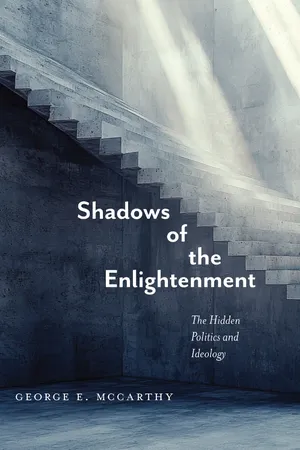
Shadows of the Enlightenment
The Hidden Politics and Ideology of the Natural and Social Sciences
- English
- ePUB (mobile friendly)
- Available on iOS & Android
Shadows of the Enlightenment
The Hidden Politics and Ideology of the Natural and Social Sciences
About this book
Shadows of the Enlightenment sheds light on the deeply political agenda underlying Western science from the so-called "Age of Reason" to the present. George McCarthy uncovers the economic, social, and historical origins of modern science, and illuminates the a priori and innate features which furnish the justifications for the technical domination and control of nature and humanity.
The natural sciences were born of a market economy, commercial trade, and industrial production, and were furthermore reflective of the values and institutions of modern capitalism and its class system in the seventeenth century. As such, one of the central roles of Western science has been to legitimate its theoretical imperative to dominate nature and to reorganize human labor for profit, property, and power. Breaking with the medieval scholastic tradition, modern science viewed nature as a reified mechanism which could be mathematically measured, empirically predicted, causally explained, and managed. Nature itself was recast as a dead machine stripped of any inherent meaning or purpose.
Ultimately, when applied to the production process, the field of natural science led to scientific management and economic exploitation; and when applied in the academy, particularly to the social sciences, the field of natural science led to the eclipse of reason and the twilight of social theory. Building upon the radical analysis of Marx and Engels, Shadows of the Enlightenment articulates a new liberatory postmodern science and technology grounded in Marx's theory of social justice, integrating ancient and modern traditions from classical Greece to the French Revolution, from the Paris Commune to the Iroquois Confederacy. In the process, McCarthy invites us to move beyond the falsely mechanistic sense of reality, and to break free from the sense of alienation that binds us all—all in order to make space for dreaming up a substantively democratic society.
Frequently asked questions
- Essential is ideal for learners and professionals who enjoy exploring a wide range of subjects. Access the Essential Library with 800,000+ trusted titles and best-sellers across business, personal growth, and the humanities. Includes unlimited reading time and Standard Read Aloud voice.
- Complete: Perfect for advanced learners and researchers needing full, unrestricted access. Unlock 1.4M+ books across hundreds of subjects, including academic and specialized titles. The Complete Plan also includes advanced features like Premium Read Aloud and Research Assistant.
Please note we cannot support devices running on iOS 13 and Android 7 or earlier. Learn more about using the app.
Information
Table of contents
- Cover
- Title Page
- Copyright
- Contents
- Dedication
- Acknowledgments
- Introduction
- Part I. The Crisis of Natural Science, Technology, and the Domination of Nature
- Part II. Natural Science, Political Economy, and the Domination of Humanity
- Part III. Social Science, Positivism, and the Domination of Reason and Society
- Part IV. Beyond the Dialectic of Enlightenment by Integrating Science and Social Justice
- Notes
- Index